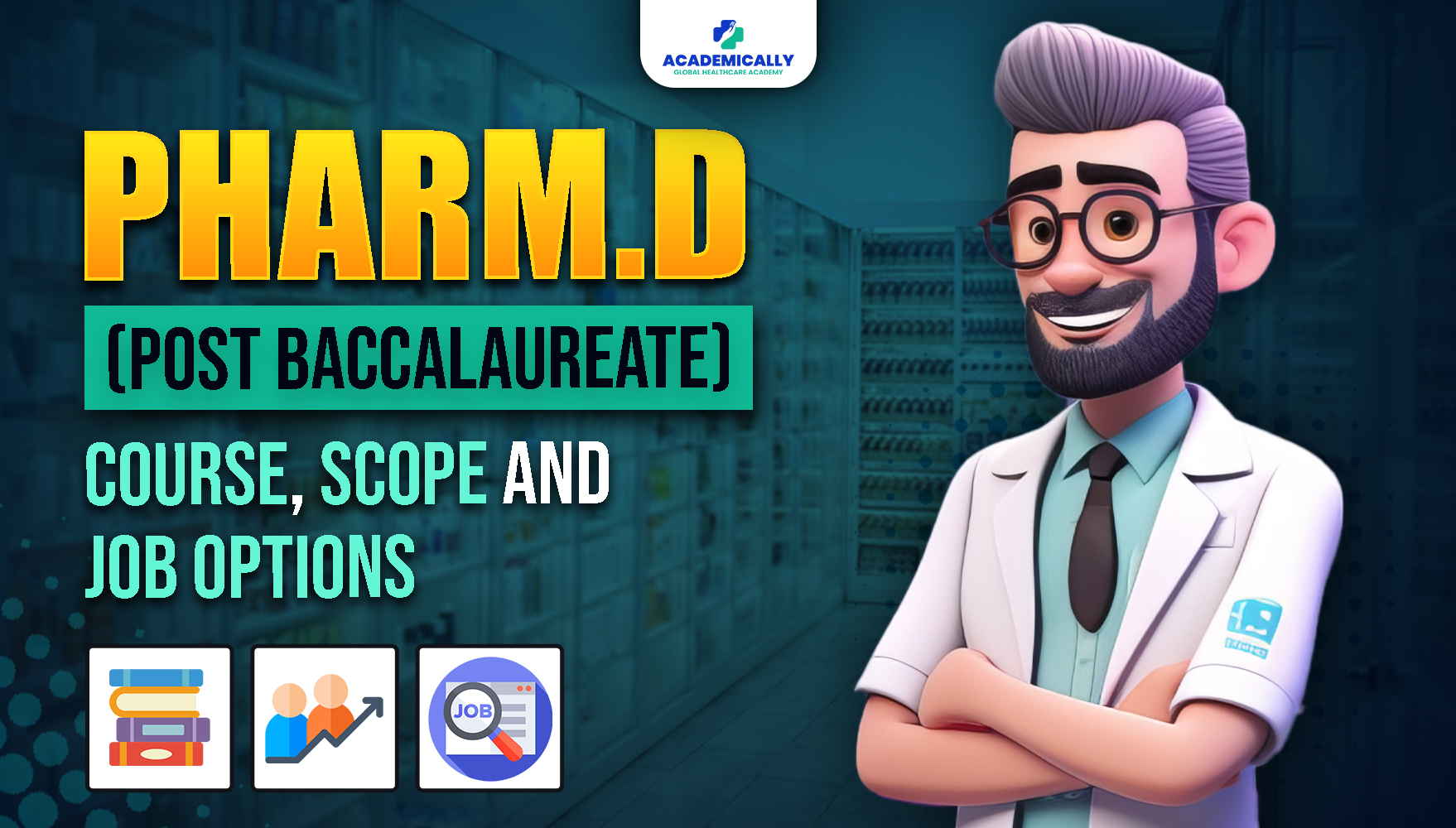Graduates can pursue careers in clinical settings, research, academia, and public health.
Are you someone who loves pharmacy and wants to learn more? If you've finished your bachelor's degree, consider doing a PharmD post-baccalaureate course. This program is excellent for people who want to improve in pharmacy and find more job opportunities.
This course teaches you a lot about medicine, how to help patients, and how to work in different places like hospitals or pharmacies. Once you finish, you can choose from many jobs like working in hospitals, helping in communities, or researching new medicines.
In this blog post, we'll explore the PharmD post-baccalaureate course, its scope and the diverse job options available to graduates.
PharmD Post Baccalaureate
PharmD (Post Baccalaureate) is a specialised program where students learn advanced skills in using medications to treat diseases and care for patients. It lasts for two years and includes a 1-year internship.
This program offers numerous benefits, such as enhancing your practical skills, providing a deeper understanding of drug therapy, and opening up a wide range of career opportunities in the healthcare sector.
Eligibility
If you already have a B Pharmacy degree, you can join this program in the 4th year through a process called Lateral Entry, known as PharmD (PB). To qualify, you need to have completed your B Pharmacy from an approved institution in India.
The Lateral Entry process involves assessing your B Pharmacy degree and relevant experience, followed by an interview. This process ensures you have the knowledge and skills to succeed in the PharmD (PB) program.
In simple terms, PharmD (Post Baccalaureate) is like a master's degree in pharmacy that focuses on practical aspects of using drugs for treatment, and PharmD (PB) is a faster track for those who already have a B Pharmacy degree.
Syllabus
Pharm.D (PB) subjects are carefully chosen to provide a well-rounded education focusing on pharmaceuticals and human physiology, given its direct impact on patient healthcare. This program is designed to equip students with comprehensive knowledge of drug therapy and the functioning of the human body. Some of the key subjects offered under Pharm.D (PB) encompass:
- Human Anatomy and Physiology
- Pharmaceutics
- Medicinal Biochemistry
- Pharmaceutical Organic Chemistry
- Pharmaceutical Inorganic Chemistry
- Remedial Biology
- Pathophysiology
- Pharmaceutical Microbiology
- Pharmacognosy & Phytopharmaceuticals
- Pharmacology
- Pharmacotherapeutics
- Pharmaceutical Microbiology
- Pharmaceutical Jurisprudence
- Pharmaceutical Formulations
- Medicinal Chemistry
- Pharmaceutical Analysis
- Hospital Pharmacy
- Clinical Pharmacy
- Biostatistics & Research Methodology
- Biopharmaceutics & Pharmacokinetics
- Clinical Toxicology
Top Colleges in India for DPharm Post Baccalaureate
- National College of Pharmacy, Kozhikode
- Parul University, Vadodara
- Integral University, Lucknow
- Institute of Chemical Technology, Mumbai
- Holy Mary Institute of Technology, Hyderabad
- Birla Institute of Technology and Science, Jaipur
- Manipal College of Pharmaceutical Sciences, Manipal
- Poona College of Pharmacy, Pune
- S.R.M Institute of Science and Technology, Chennai
- JSS College of Pharmacy, Mysore
- Dr. Harisingh Gour Vishwavidyalaya, Sagar
- Rathnam Institute of Pharmacy, Nellore
- Shadan College of Pharmacy, Hyderabad
- Delhi Institute of Pharmaceutical Sciences and Research, New Delhi
- Bombay College of Pharmacy, Mumbai
- Nirma University, Ahmedabad
- JSS College of Pharmacy, Chennai
- Andhra University, Visakhapatnam
- Sri Ramachandra University, Chennai
- Banasthali Vidyapith, Banasthali
Scope of PharmD Post-Baccalaureate
A PharmD post-baccalaureate course is designed for individuals who have already completed a bachelor's degree in a related field and want to pursue a career in pharmacy. This advanced program typically spans three years in India. The intensive curriculum covers various subjects related to pharmaceutical sciences, pharmacotherapy, patient care, and pharmacy practice.
Students enrolled in a PharmD post-baccalaureate course can expect to gain in-depth knowledge and practical experience in areas such as:
Pharmacology and Pharmacotherapy: Understanding the mechanisms of action, therapeutic uses, and adverse effects of various drugs.
Pharmacy Practice: Learning about medication dispensing, patient counselling, medication therapy management, and pharmacy law and ethics.
Clinical Pharmacy: Developing clinical skills to provide pharmaceutical care in healthcare settings, including hospitals, clinics, and community pharmacies.
Pharmaceutical Sciences: Studying drug formulation, manufacturing, quality assurance, and regulatory affairs.
Patient Care: Focusing on patient assessment, medication management, health promotion, and disease prevention.
Job Options After PharmD Post-Baccalaureate
Upon completing a PharmD post-baccalaureate course, graduates have many job options. Some of the most common career paths include
Clinical Pharmacist: Clinical pharmacists work directly with healthcare providers to optimise patient medication therapy. They participate in patient care rounds, provide drug information, and collaborate with other healthcare professionals to ensure safe and effective medication use.
Hospital Pharmacist: Hospital pharmacists are responsible for dispensing medications, managing pharmacy operations, and providing clinical services to patients admitted to the hospital. They work closely with physicians, nurses, and other healthcare professionals to ensure the safe and timely delivery of medications.
Community Pharmacist: Community pharmacists work in retail pharmacies, where they dispense medications, provide patient counselling, and offer medication management services. They are vital in promoting health and wellness within their communities and are often the first point of contact for patients seeking healthcare advice.
Clinical Research Pharmacist: Clinical research pharmacists work in pharmaceutical companies, contract research organisations (CROs), or academic institutions, where they design, conduct, and analyse clinical trials to evaluate the safety and efficacy of new drugs and therapies.
Pharmacy Manager/Administrator: Pharmacy managers and administrators oversee the operations of pharmacies, including staffing, budgeting, inventory management, and regulatory compliance. They are crucial in ensuring pharmacy services' efficient and effective delivery.
Pharmaceutical Industry: Graduates of PharmD post-baccalaureate programs may also pursue careers in the pharmaceutical industry, working in areas such as drug development, regulatory affairs, medical affairs, or pharmacovigilance.
Academia: Graduates can pursue academic careers by teaching pharmacy students or conducting research at universities, contributing to advancing pharmaceutical knowledge.
Research: Opportunities in research involve working in laboratories or pharmaceutical companies, where graduates contribute to developing new drugs or improving existing medications.
Consulting: PharmD graduates can provide healthcare organisations or businesses with expertise in medication management, regulatory compliance, and other pharmacy-related matters.
Public Health: Roles in public health involve promoting health awareness, managing medication distribution in communities, and working on policy development to enhance healthcare access and outcomes.
Abroad: International opportunities allow graduates to work on global health initiatives or join organisations like the World Health Organization, contributing to healthcare advancements worldwide.
Also Read: How a Pharmacist Can Migrate to Australia
Finally
A PharmD post-baccalaureate is a lateral entry course that offers a comprehensive education in pharmacy and opens up a wide range of rewarding career opportunities in various healthcare industry sectors.
Whether you aspire to work in a clinical setting, a community pharmacy, or the pharmaceutical industry, this advanced program equips you with the knowledge, skills, and practical experience needed to succeed in the dynamic and evolving pharmacy field.
Fill up this form for a free one on one counselling session.



